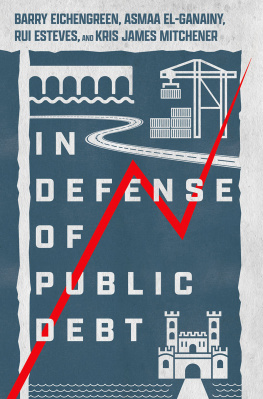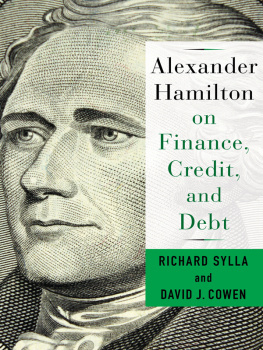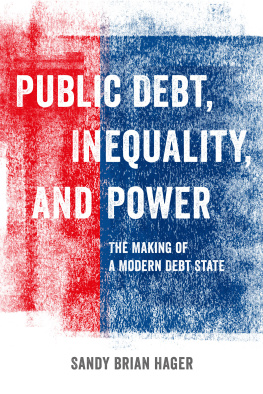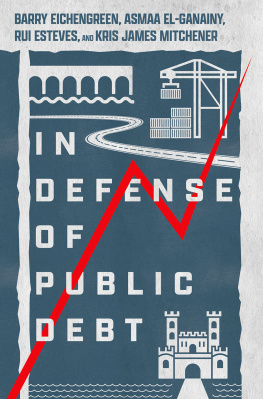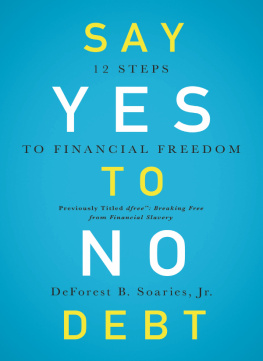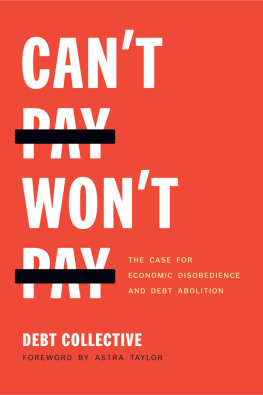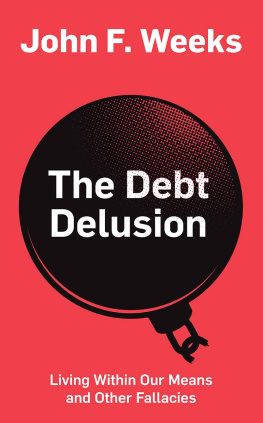ADVANCE PRAISE FOR In Defense of Public Debt
Discussions of sovereign debt are always the same, yet always different. Why debt finance? How much can we borrow? Should creditors worry? The authors take us on a fascinating 2,500-year tour of sovereign debt through the ages, the discussions, the successes, and the failures. The bottom line: Well-used, debt finance has been and is precious. The latest example: The use of debt during the Covid crisis. A must read for anybody interested in current debt debates.
Olivier Blanchard, Professor of Economics Emeritus, MIT, and Senior Fellow, Peterson Institute for International Economics
An exceptionally comprehensive and readable history of public debt from ancient Greece to modern Greece and from Argentina to Australia to Asia to America. This book is rich with detail, studded with lessons learned, forgotten, and learned again, and packed with analytical perspective that reflects decades of scholarship. It is a timely reminder to governments, lenders, investors, and ordinary citizens that, if you dont know where youve been, you probably dont know where you are going.
David Wessel, Director, Hutchins Center on Fiscal and Monetary Policy, Brookings Institution
Repeatedly since the 1980s, Americans have been told to worry about the size of the federal debt. And yet the debt has continued to grow absolutely and as a share of gross domestic product, with few of the predicted adverse consequences. Building expertly on large and complex literatures in history, economics, and political science, In Defense of Public Debt offers a balanced account of the positive and negative aspects of public debt, showing the vitally important role government borrowing can play in a time of crisis, but also the very real problems that can arise when debts grow too large. At a time when too many policymakers subscribe to naive ideas about public finance, this is a book that cries out for a readership beyond the academy.
Niall Ferguson, Milbank Family Senior Fellow, Hoover Institution
For a typical citizen, protection in war-time or in a pandemic reveals their government to be a problem-solver rather than the problem. Yet the legacy of such episodes in the accumulated national debt is widely misunderstood, opening the way to too rapid a turn to austerity. In Defense of Public Debt provides enlightenment and reassurance by inviting the reader to follow how public debtwarts and allhas helped create the modern world.
Wendy Carlin, Professor of Economics, University College London
In Defense of Public Debt could not be timelier. It is an engaging and informative account of the use and misuse of government borrowing, from early times to the Covid pandemic. The unquestionable expertise of the authors, and their non-partisan reading of the evidence from our past, will serve to guide the intelligent reader as they wrestle with one of the most important issues of our time: Are we borrowing too much?
Raghuram Rajan, Professor of Finance, University of Chicago
How much debt should a country accumulate during a crisis? And afterwards? To know what works and what doesnt requires verdicts on past performances. The authors deliver the verdicts, applying sound principles in a definitive global history of public debt.
Peter H. Lindert, Distinguished Professor of Economics (Emeritus), University of California Davis
With so much nonsense about the public debt in the air, it is refreshing to discover a work of such intelligence, balance, and erudition. Read In Defense of Public Debt for fun and profit. Then send an excerpt or two to your favorite politicians.
Alan S. Blinder, Gordon S. Rentschler Memorial Professor of Economics and Public Affairs, Princeton University
In this fascinating and comprehensive history, the authors provide a much-needed antidote to the simplistic accounts that so often dominate debates about government debt. From its earliest origins to today, public borrowing has sometimes led to spectacular failures, but it has also allowed societies to achieve objectives that would have been impossible in its absence. As we ask where we stand with public debt today, there is no better book to remind us of the lessons of history.
David Stasavage, Julius Silver Professor of Politics, New York University
In Defense of Public Debt

Oxford University Press is a department of the University of Oxford. It furthers the Universitys objective of excellence in research, scholarship, and education by publishing worldwide. Oxford is a registered trade mark of Oxford University Press in the UK and certain other countries.
Published in the United States of America by Oxford University Press
198 Madison Avenue, New York, NY 10016, United States of America.
Barry Eichengreen, Asmaa El-Ganainy, Rui Esteves, and Kris James Michener 2021
All rights reserved. No part of this publication may be reproduced, stored in a retrieval system, or transmitted, in any form or by any means, without the prior permission in writing of Oxford University Press, or as expressly permitted by law, by license, or under terms agreed with the appropriate reproduction rights organization. Inquiries concerning reproduction outside the scope of the above should be sent to the Rights Department, Oxford University Press, at the address above.
You must not circulate this work in any other form and you must impose this same condition on any acquirer.
CIP data is on file at the Library of Congress
ISBN 9780197577899
eISBN 9780197577912
DOI: 10.1093/oso/9780197577899.001.0001
Contents
On December 21, 2020, as the number of Americans who had died from COVID-19 approached 319,000, Senator Rand Paul, Republican from Kentucky, took to the floor of the Congress, not to address the public health emergency but to express concern about the governments spiraling debt. How bad is our fiscal situation? he asked. Well, the federal government brought in $3.3 trillion in revenue last year and spent $6.6 trillion, for a record-setting $3.3 trillion deficit. If youre looking for more COVID bailout money, we dont have any. The coffers are bare. We have no rainy-day fund. We have no savings account. Congress has spent all of the money.
From fiery rhetoric, the senator pivoted to economic analysis. Todays money is gone, he explained, so Congress is spending tomorrows money.... When we talk about spending tomorrows money, this is not just money we will need next month; this is money we will need in a decademoney we will need in one, two, and three generations from now. For national defense. For infrastructure. This is money that your children and grandchildren will pay back with interest, and it is going up by more than a trillion dollars every year. Instead of enjoying the same wealth and opportunity that we have enjoyed in this country, our children will be stuck paying our billswith interest.
Senator Pauls appeal built on an important insight, namely that government is the steward of the nations finances. If it mismanages them by borrowing excessively, worrisome economic and financial consequences will follow. But the implication he drewthat the government should balance its budget, just as a household should balance its budget in order to avoid mortgaging the futurewas fundamentally flawed. Indeed, a government that did not borrow in order to provide essential services during a deadly pandemicor to ensure the national defense during a security emergency, or to invest adequately in the productive infrastructure of which Senator Paul spokewould be accused of dereliction, and rightly so. Such a government, to continue the analogy with a household, would be like parents who refused to borrow to obtain life-saving surgery for a child.

